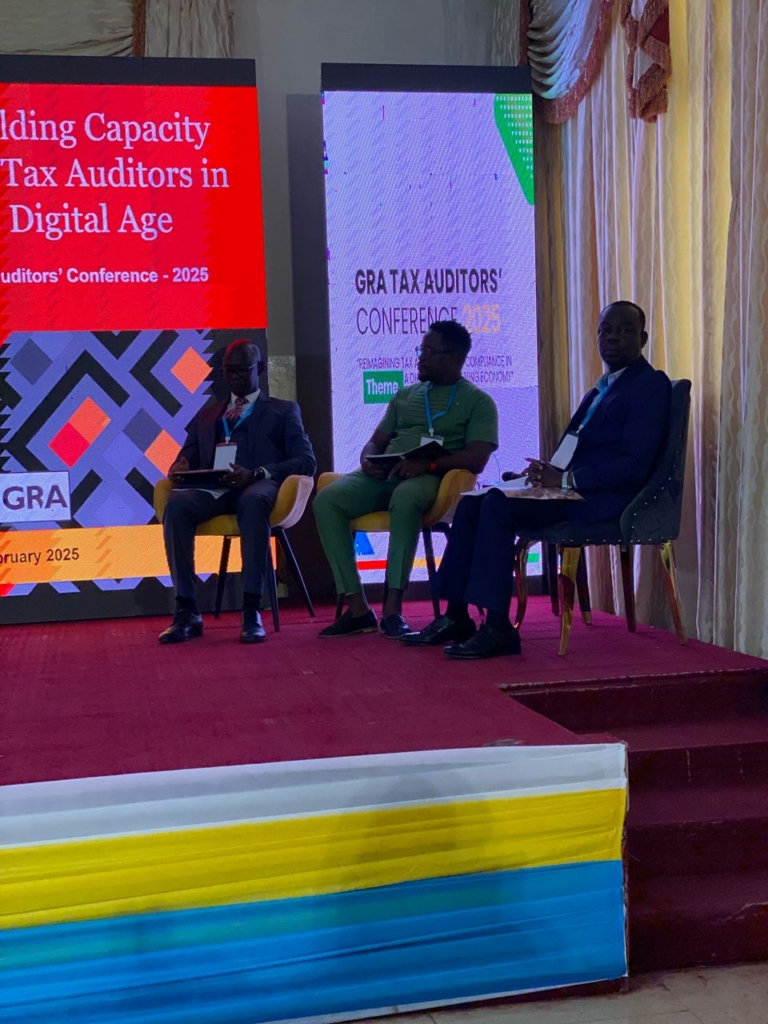
Audio By Carbonatix
A Senior Manager of Tax and Regulatory at Deloitte Ghana, Henry Laryea Quartey, has recommended some key leadership strategies to the Ghana Revenue Authority in managing change under its Audit Transformation Agenda.
This he believes will better modernize and reposition the tax audit function as very efficient and expose tax auditors to new audit methodologies, digital tools and risk-based approaches.
Speaking as a panelist on the topic "Building Capacity for Tax Auditors in the Digital Age" at the Just-ended Tax Auditors' Conference 2025, Mr. Quartey identified the need for the leadership of GRA to have a contextualized vision.
“While global best practices are valuable, the GRA's digital vision must be rooted in Ghana's specific needs and circumstances; and considering the current state of technology infrastructure, taxpayer demographics and the existing capacity of GRA audit staff”, he mentioned.
A "big bang" approach to digital transformation can be risky. A phased implementation strategy would allow the Authority to test and refine new systems and processes, learn from early experiences, and build momentum”, he added.

Among other strategies, Mr. Quartey said there is a need for consistent stakeholder engagements and effective communication. Beyond internal communication, active engagement with taxpayers is critical.
He called for deliberate efforts to understand taxpayers' needs regarding digital services and conduct public surveys, focus group discussions, and fora to gather feedback and trust, adding, “This is especially important in our part of the world where digital literacy significantly varies”.
“In addition to capacity building tailored to the local needs of GRA audit staff, the leadership of the GRA should identify and empower "digital champions " within the Authority. These individuals would act as advocates for change, provide support to their colleagues and help to build the needed culture of innovation”.
He also urged the leadership to take lessons from other jurisdictions including Rwanda, Italy, and Estonia on how leadership strategies have been used to manage change in their tax administrations.
In Italy for instance, he said the tax authority laid great emphasis on data analytics and the use of Artificial Intelligence in tax compliance, stressing that in detecting tax breaches. AI helps to identify taxpayers' risk levels and ensure high-risk taxpayers explain any discrepancies detected.
The GRA Tax Audit Conference 2025 is a pivotal step in GRA’s ongoing Audit Transformation Agenda, aimed at modernizing and repositioning the tax audit function as a strategic tool for compliance.
The conference provided a transitioning mechanism for the GRA tax auditors, exposing them to new audit methodologies, digital tools and risk-based approaches.
Latest Stories
-
The prodigal artiste: Why Ghanaian musicians need to lawyer up
10 minutes -
Our politics is corrupt; rule by the rich is not democracy
18 minutes -
Sesi Technologies launches AI-Powered soil testing services for smallholder farmers
28 minutes -
Ghana Chamber of Shipping calls for a 3-month grace period on cargo insurance directive
33 minutes -
NACOC to begin licensing for medicinal and industrial cannabis cultivation
48 minutes -
It’s easier to move from GH₵100k to GH₵1m than from zero to GH₵100k- Ecobank Development Corporation MD
52 minutes -
Between faith and rights: A nuanced strategic view on the debate over an Islamic widow’s political ambition
1 hour -
At least Baba Jamal should have been fined – Vitus Azeem
1 hour -
Gender Minister visits the 31st December Women’s Day Care Centre and the Makola clinic
1 hour -
Ayawaso East NDC primary: Why feed people for votes? Are they your children? – Kofi Kapito
1 hour -
Ziavi Traditional area begins final funeral rites for Togbega Kwaku Ayim IV
1 hour -
Photos: Mahama swears in Presidential Advisory Group on Economy
1 hour -
Ghana intensifies boundary pillar construction with Côte d’Ivoire
1 hour -
NHIA settles December–January claims worth GH¢400m for service providers
2 hours -
Mahama warns economic advisers of ‘rough road ahead’ amid debt distress
2 hours

